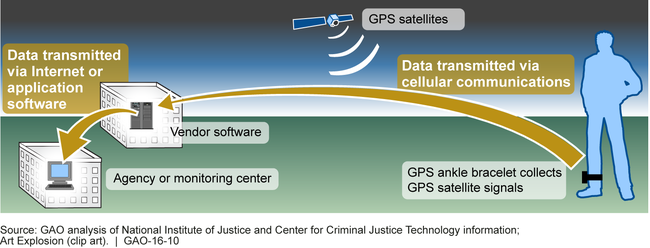Electronic Monitoring: Draft National Standard for Offender Tracking Systems Addresses Common Stakeholder Needs
Highlights
What GAO Found
The National Institute of Justice (NIJ) collaborated with a variety of criminal justice and technical experts to develop a draft standard for offender tracking systems (OTS), but earlier involvement of manufacturers could have expedited its development. For example, the committee that developed the draft standard included practitioners spanning all levels of government and program areas such as pretrial, probation, and parole services and technical experts with backgrounds in developing test methods for performance standards. NIJ invited manufacturers to provide input through a workshop held in May 2011 and two subsequent public comment periods. GAO found that earlier and ongoing involvement of OTS manufacturers could have better informed and facilitated development of the OTS standard by, for example, providing insights on OTS capabilities and limitations at the outset. Coordination has improved since 2012, and manufacturers' major concerns have been addressed.
Global Positioning System (GPS) Offender Tracking System

NIJ's draft OTS standard and guide address many common stakeholder needs and challenges. The draft standard includes requirements for common operational and circumvention detection needs. For example, requirements for location accuracy and the ability to provide alerts when an offender tries to remove the device or is at a prohibited location are included in the standard. In addition, the draft guide provides information and guidance related to challenges identified by the criminal justice agencies GAO met with as well as other considerations for implementing an OTS program. These challenges include
- misconceptions among the public and victims that OTS allows agencies to prevent bad behavior before it happens;
- developing appropriate protocols to respond to OTS alerts, such as those for tampering with the tracking device; and
- workload issues, such as whether there is sufficient staff or resources to respond to OTS alerts 24 hours a day, 7 days a week.
In recognition of the range of agencies, resources, and objectives of offender tracking, the guide provides information and guidance, and does not offer “one size fits all” solutions.
Why GAO Did This Study
OTS is an electronic monitoring technology consisting of hardware, such as an ankle bracelet, used for collecting Global Positioning System (GPS) signals to determine an individual's location, and software for analyzing data collected from the hardware device. While demand for GPS-based electronic monitoring devices has increased, there are currently no standards that OTS devices are required to meet. In 2009, NIJ initiated development of a voluntary OTS standard and companion guide, which is expected to be published no later than March 2016. GAO was asked to review NIJ's approach for developing the OTS standard.
This report examines the extent to which (1) NIJ collaborated with stakeholders in developing the standard, and (2) the standard and guide address stakeholder needs and challenges. GAO analyzed NIJ's draft OTS standard, companion guide, and standard development process. To obtain perspectives on the standard development process and OTS needs and challenges, GAO interviewed stakeholders including NIJ officials, practitioners and experts who developed the standard, criminal justice and victims' associations, manufacturers, and officials from a nongeneralizable sample of 10 criminal justice agencies that employ OTS. GAO selected the 10 criminal justice agencies based upon a combination of factors, including ensuring a range of federal, state, and local jurisdictions, among other things.
For more information, contact David C. Maurer at (202) 512-8777 or maurerd@gao.gov.
